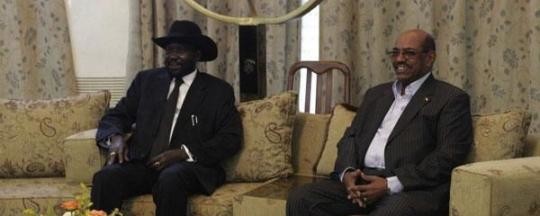The South Sudanese president visited his counterpart in Khartoum on Saturday to discuss security and economic issues.
At a joint press conference at Khartoum Airport prior to Kiir’s departure, the two leaders reaffirmed their commitment to a Cooperation Agreement signed in September 2012.
The deal covered oil issues, border security, trade, nationality and other matters. But political backing for the agreement was fairly weak until March 2013, when the two countries signed an implementation matrix that gave some greater impetus to the deal.
However, a signficiant number of provisions of the September 2012 accord have yet to implemented. Speaking on Saturday, Bashir said that he discussed with the South Sudanese leader matters relating to the agreement as well as the security situation in the two countries and agreed to coordinate efforts to achieve security and stability.
Kiir said they agreed to set up mechanisms to reactivate implementation of the joint cooperation agreement signed between the countries in Addis Ababa.
The online daily Sudan Tribune reported that Kiir asked for Khartoum’s support by tightening control along the borderline between the two countries, adding that both sides also discussed ways for protecting oilfields against potential attacks by South Sudanese rebels.
Citing an official source, Sudan Tribune also reported that Juba asked Khartoum to back its stance within the East African regional block IGAD with regard to participation of the seven detained SPLM leaders in the negotiations between the government and the rebels.
The last time the two leader met was in January when Bashir visited Juba soon after the outbreak of violence.
Although production in the Unity State fields has been shut down, Sudan and South Sudan continue to share oil revenue from the fields in Upper Nile State.
The oil is pumped through pipelines running north to a port on Sudan’s Red Sea coast. Khartoum earns transit fees for this service, at an agreed rate per barrel.
File photo




